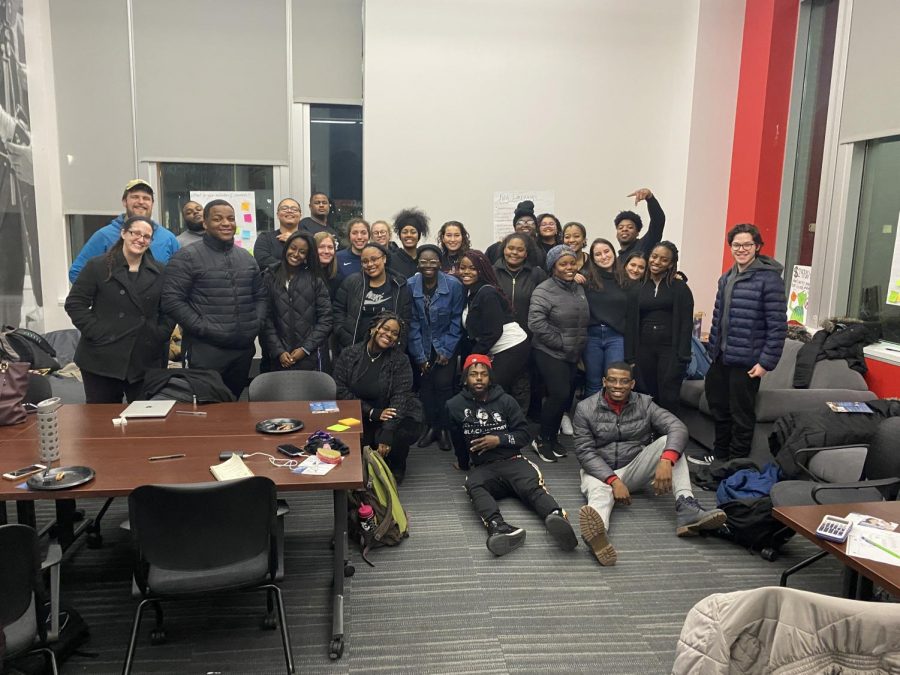Black history and the UW-System
Speakers from Leaders Igniting Transformation visit campus
Photo by Submitted
UW-Eau Claire students discussed what black history means to them today.
On Monday night, speakers from Leaders Igniting Transformation (LIT) visited the UW-Eau Claire campus to talk about the important historical events regarding black history in the UW-System and their relevance today.
Black History Month: Leaders Igniting Transformation: The Future is Young, Black, Brown and Lit! was organized by the Office of Multicultural Affairs as a part of celebrating Black History Month.The two guest speakers were Lamonté Moore, director of College Organizing and Dakota Hall, executive director of LIT.
LIT is a Milwaukee-based non-profit organization that focuses on building independent political power for social, racial and economic justice for young people. LIT provides support and resources through campaigns, leadership development and civic engagement.
Moore introduced the students to the mission of LIT and said that the organization focuses on understanding the power young people have and how their academic experiences can be improved.
Hall gave a presentation on the Black Student Strike that happened in 1969 on UW-Madison campus. The strike involved black students creating 13 critical demands regarding racial inequality in UW-Madison administrative system and delivering those demands to the chancellor’s office. Read more about the history and timeline of the strike on UW News website.
Together with the students, Hall went through all of the demands and encouraged them to think about what has changed since then.
“I encourage you to recognize where you see yourselves in this event, what you see on UW-Eau Claire campus and what progress we have made in the last 51 years in terms of the black struggle in the UW-System,” Hall said.
Hall also said the silent protest that happened at UW-Eau Claire in November 2019 was similar to Black Student Strike.
“Imagine continuously having to do that. Students shouldn’t come to school to go on strikes, students should come to school to learn and to be in a safe environment,” Hall said. “When moments like that happen, action happens.”
To further educate students on black history, Moore recommended a list of books and films that are relevant to the topic of the event:
- “Message to the Millineals” by Rizza Islam
- “Power vs. Force” by Dr. David R. Hawkins
- “The Isis Papers: The Keys to the Colors” by Frances Cress Welsing
- “The New Jim Crow: Mass Incarceration in the Age of Colorblindness” by Michelle Alexander
- “Slavery by Another Name” directed by Samuel D. Pollard
- “Who Killed Malcolm X?” directed by Phil Bertelsen Rachel Dretzin.
The event ended with an activity that involved the students sharing their opinions and values regarding black history, white supremacy, success, support and self-evaluation.
Miko Scott, a fourth-year applied math and statistics student and president of Black Student Alliance, said that it is essential to remember the history and make sure that students are well-educated.
“It was important to have an event that discussed the history, what has changed since then and what is happening right now,” Scott said. “I think tonight was more about the motivation, especially for the future and what’s to come.”
Scott said that her personal takeaway from the event was realizing how much of the ongoing problems should have been solved decades ago.
“Most of the time it’s common for people of color to doubt themselves because of that,” Scott said. “I think the biggest obstacle is that we’re not in charge of making a lot of decisions, so it’s harder to make an actual change.”
LIT is a growing organization and is currently looking to hire a communication director, campus organizer and high school fellow. For more information visit their website.
Klavina can be reached at [email protected].


